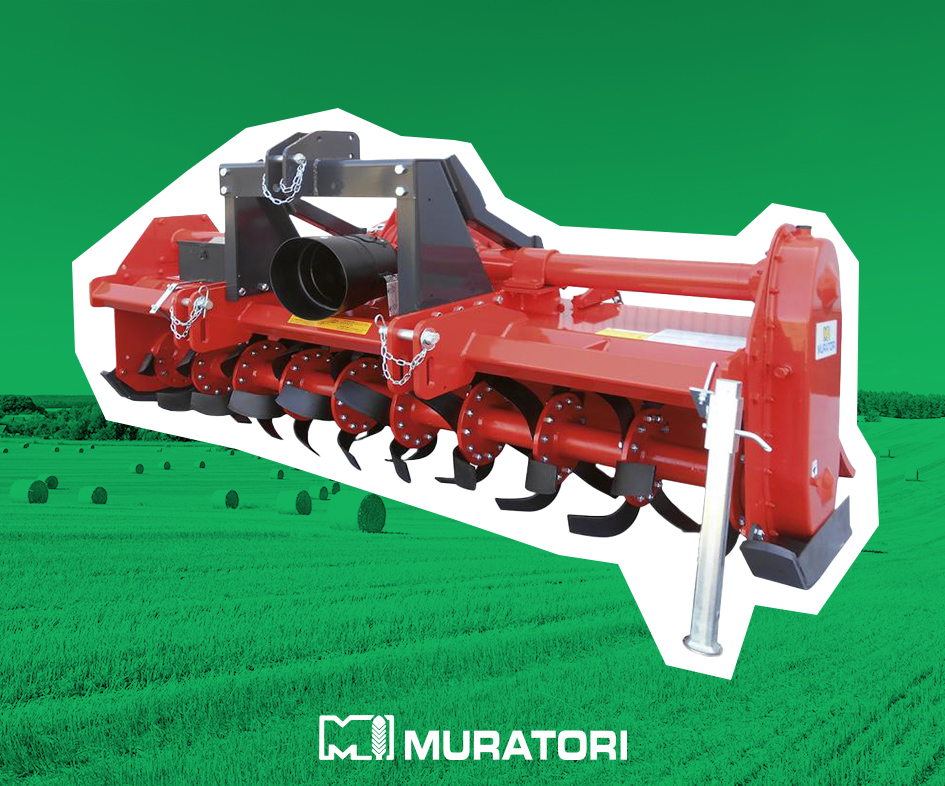The Rotary tiller
Modern agriculture increasingly relies on technology to optimise cultivation operations and maximise crop yields. Of the many innovations that revolutionised the industry, the rotary tiller was a key pillar. This agricultural machine, with its established and well-known technology, has nevertheless evolved over time while maintaining an important role in the agricultural landscape. Characterised by great versatility, it not only simplifies your work, but also plays a crucial role in working the soil, ensuring an optimal environment for crop development. In this article, we will explore in detail what the rotary tiller is, its evolution and the role it still plays in modern agriculture.
What is the rotary tiller?
A rotary tiller is an agricultural machine designed to work the soil. It is used to till and level the soil in preparation for sowing or to reclaim it from grass and residues. Rotary tillers can be of different types depending on your specific needs; they operate by means of a horizontally rotating shaft, on which blades are fixed, that penetrate the soil to break it up. It is still a valid and versatile tool in today’s agriculture.The evolution of the rotary tiller
Tilling has a long history dating back to the very beginnings of agriculture itself. Originally conceived as a manual action using rudimentary tools, it has undergone a major evolution in the last century to become an operation entrusted to a mechanical instrument, the rotary tiller, attached to a tractor.Through innovation and technological development, the modern rotary tiller has adapted to the changing needs of contemporary agriculture. Today, it is available in a wide range of sizes, configurations and functionalities, offering tailor-made solutions for every type of cultivation and terrain. From small farms to large plantations, the rotary tiller is still an important element in ensuring efficient and sustainable production.
How does it work and what benefits does it bring?
The rotary tiller still plays an important role in the many stages of soil work, where its versatility and functionality are an important asset in multiple contexts.1. Working the soil Its tilling action breaks up the soil, removing any compacted layers that could hinder crop growth. This action improves the soil structure, making it more permeable to water and air, thus facilitating root penetration and drainage, which are essential for healthy plant growth.
2. Weed removal It eliminates competition from unwanted plants that could stifle crop growth. This action not only reduces the need for chemical herbicides, thus contributing to more sustainable agronomic management, but also ensures a healthier environment for plant development.
What is its role in sustainable agriculture?
In addition to improving operational efficiency and crop yields, the rotary tiller plays a key role in sustainable agriculture. By reducing the use of harmful chemicals and promoting environmentally friendly soil management practices, it helps reduce the environmental impact of farming practices. Furthermore, by improving soil quality, the rotary tiller helps to preserve soil fertility in the long term, ensuring the sustainability of farming operations.Muratori rotary tillers
To maximise the benefits of the rotary tiller, it is essential to select the model best suited to your specific farming needs, considering factors such as size, soil characteristics and type of crop.At Muratori we manufacture versatile rotary tillers, suitable for primary working on compact soil and for secondary working, on land previously worked with a plough or harrow. Being multi-purpose, Muratori rotary tillers are perfect for a variety of uses, such as vegetable gardens, parks, gardens, orchards, vineyards and open fields. They are the ideal tool for any type of cultivation. Discover the entire range by clicking here!
Correct use, regular maintenance and a few simple attentions including periodic lubrication, proper adjustment and replacement of consumable parts ensure optimal operation, prolonging the machine’s service life for several years.
In conclusion, at a time when efficiency and sustainability are at the heart of modern agriculture, the rotary tiller stands out as an extremely useful tool for farmers all over the world. With its contribution to soil preparation and weed control as part of sustainable farming practices, this machine is a key investment for people like you who cultivate the land. By taking full advantage of the benefits of the rotary tiller and integrating it into a holistic approach to farm management, you can improve productivity, reduce environmental impact and ensure the long-term sustainability of your operations.


